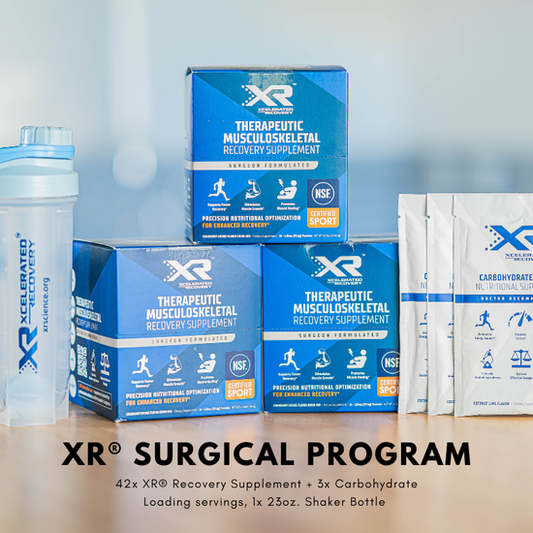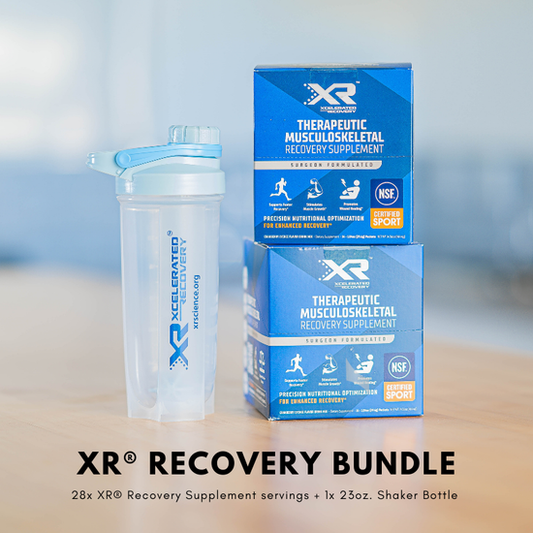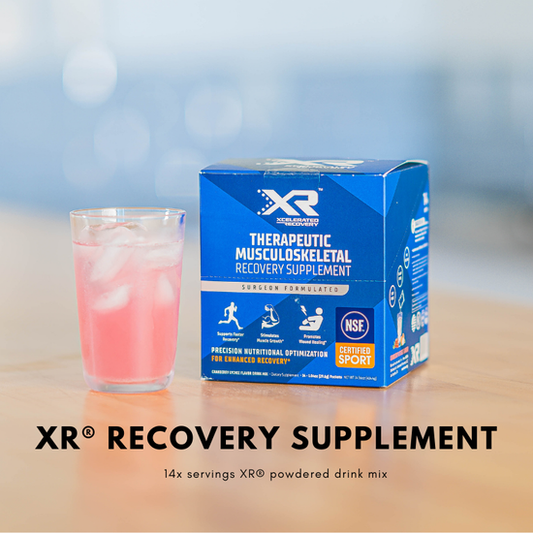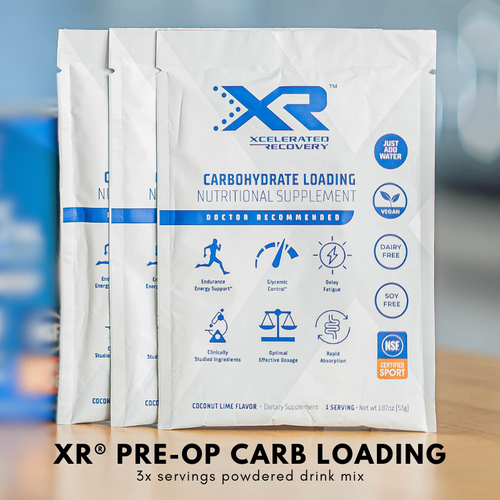
Pre-Op Carbohydrate / Amino Acid Loading Nutritional Strategies for Enhancing Surgical Outcomes
Share
Author: Dr. Shawna Dorman, Head of Anesthesia and Medical Director at Kerlan-Jobe Surgery Center
The field of peri-operative care is rapidly evolving. Nutritional status is recognized as a modifiable risk factor for improving postoperative outcomes. Enhanced Recovery After Surgery (ERAS) programs have established guidelines to minimize the surgical stress response and the deleterious effects that it has on patients. ERAS protocols such as screening for poor nutritional status and providing preoperative carbohydrate clear fluids instead of fasting provide effective measures to improve outcomes and decrease postoperative complications. [1-3]
The conventional method of preoperative preparation has traditionally involved a prolonged period of pre-operative food and water fasting. This practice, which originated in the early 20th century as a safety measure to reduce the risk of aspiration during anesthesia, has been challenged in recent years due to evidence that it causes increased stress for patients and negatively impacts their health and recovery. Therefore, ERAS protocols no longer endorse prolonged preoperative fasting, recognizing that it triggers the body's starvation response, worsening the catabolic effects of surgery.
A reduction of the catabolic stress of surgery itself is one of the most important elements in ERAS perioperative management protocols. In regards to perioperative nutritional optimization, ERAS recommendations include the following four elements: removal of the preoperative fasting period, carbohydrate loading up to 2 hours before surgery, early initiation of postoperative oral ingestion, and promotion of intestinal motility.
The Surgical Stress Cascade
Surgery triggers a cascade of inflammatory, immune, and metabolic responses that result in a hypermetabolic-catabolic state, as described by Hirsch et al. (2021) [4]. This state results in significant metabolic changes of the endocrine and immunologic systems. The release of catecholamines, cortisol,glucagon, and growth hormone, in addition to interleukin-6 (IL-6) and IL-1, cause immunosuppression and insulin resistance causing hyperglycemia and negatively impact metabolism. Hyperglycemia is a marker of the metabolic response to trauma and is related to the invasiveness of the surgery and the duration of preoperative fasting. Additionally, the body's demand for amino acids (AA) significantly increases during this period. To meet this demand and aid in wound healing, the body breaks down skeletal muscle, which serves as the body's only reservoir for AA.
Fasting additionally depletes glycogen stores, stimulating gluconeogenesis using amino acids derived from further breakdown of skeletal muscle. The stress of surgery, compounded by fasting, leads to a heightened catabolic response resulting in loss of lean body mass (LBM), which may be deleterious to patient strength, mobilization, respiratory mechanics, and wound healing. These mediators are linked to metabolic changes early after surgery, and acute-phase proteins, such as C-reactive protein, albumin and prealbumin, may also be useful as predictors of post-operative infection.
Preoperative Carbohydrate Loading
The practice of preoperative carbohydrate loading has been found to mitigate the negative effects of fasting before surgery by placing the body in a state of nourishment. In this state, anabolic pathways are dominant, restoring glycogen levels, increasing muscle uptake of glucose, enhancing insulin sensitivity, and reducing protein catabolism.
Several studies have demonstrated the benefits of carbohydrate loading before surgery, including reduced stress hormone levels, lowered markers of inflammation, improved glucose control, improved patient outcomes and decreased postoperative complications. [5-7]
Maltodextrin is an easily digested carbohydrate made from corn starch. It contains small chains of several dextrose molecules held together by very weak hydrogen bonds. This makes its absorption slower than sucrose and thus elicits maltodextrin as an excellent fuel for preoperative drinks. Sports drinks which contain a higher sucrose content and higher osmolarity do not provide the same level of improvement in insulin sensitivity as well as having inferior gastric emptying times. Multiple studies in orthopedic surgery have confirmed the safety of utilizing a clear maltodextrin supplement with a low osmolarity concentration in both elderly as well as Type II diabetic patients undergoing joint arthroplasty. [8-10]
In addition, some studies have also demonstrated improvements in insulin sensitivity, decreased nausea and vomiting, decreased length of stay and 90-day readmission rates [11]. Surgical patients may also experience benefits from carbohydrate loading, such as increased muscle glycogen stores for improved endurance during surgery and recovery, reduced muscle damage and inflammation, increased insulin sensitivity, and improved immune function. A systematic review published in the British Journal of Anaesthesia in 2014 also found that carbohydrate loading prior to surgery was associated with improved muscle function and reduced postoperative complications. [12]
A study published in the Journal of the American Academy of Orthopaedic Surgeons in 2022 by Choi et al. found that preoperative oral carbohydrates are safe for older adults undergoing total hip or knee arthroplasty [13]. The study, which was a prospective randomized trial, found that preoperative oral carbohydrates did not increase insulin resistance in older adults and can be safely implemented as part of a preoperative nutrition regimen.
Surgical Stress Reduction: AMINO ACIDS
Recently, formulas that include either proteins or amino acids in addition to carbohydrate-enriched drinks have been proposed. Advances in nutritional science have led to supplementation strategies to further mitigate the surgical stress response through the use of amino acids.
These new formulas may improve postoperative muscle strength, reduce fatigue, anxiety and discomfort as well as lowering the endocrine-metabolic response to trauma [14]. The branched-chain amino acids (leucine, isoleucine, and valine) are rapidly used by skeletal muscle during stress and highly stimulate protein synthesis [15,16]. The use of the conditionally essential amino acids glutamine and arginine in the composition of these drinks has also improved the hepatic and mitochondrial metabolic response in two recent studies [17,18].
Additionally, supplementation with the amino acids cystine/theanine exhibit significant stress-reducing effects through anti-inflammatory and immune modulating properties.
After entering cells, cysteine and glutamic acid are used together for the synthesis of Glutathione (GSH), one of substances with the strongest antioxidant effects in the body and important for adjusting immune function[19]. Therefore, cystine/theanine have been termed stress-reducing amino acids. These potent immune modulating effects have been studied in various settings including post surgical patients [20] as well as high level athletes. [21-23]
Early initiation of enteral nutrition during the perioperative period is widely acknowledged for its ability to optimize enhanced recovery. Additionally, research has shown that orally ingested amino acids can have a similar stress-reducing effect by increasing anabolic pathways for muscle protein synthesis and reducing stress through GSH pathways. [24,25]

Figure 1: Perioperative management. To shorten the catabolic phase, minimally invasive surgery and nutritional therapy, including postoperative early enteral feeding (an element of ERAS) and oral intake of cystine/theanine, are effective. ERAS: enhanced recovery after surgery.
The field of perioperative care is rapidly advancing with a strong emphasis on improving post-surgery recovery, particularly by reducing the negative effects of the surgical stress cascade. The traditional approach of prolonged fasting is no longer considered effective and has been shown to harm patients, as the body's response to surgical trauma is actually worsened by prolonged fasting.
Advances in nutritional science have revealed that combining specific supplements such as carbohydrates and amino acids can effectively decrease the surgical stress response.[26]
In conclusion, carbohydrate loading alone or combined with amino acids before surgery has been shown to be an effective and safe nutritional strategy in improving patient outcomes by reducing the stress response caused by surgical trauma. By placing the body in a fed state instead of a fasted state, one can improve muscle function, reduce stress response, improve postoperative glucose control, reduce preoperative discomfort and reduce postoperative complications.
Resources:
- Ljungqvist O, Nygren J, Thorell A, et al. Starvation, carbohydrate loading, and outcome after major surgery. BJA Education. 2017;17(9):312-316.
- Nygren J, Soop M, Thorell A, et al. Preoperative oral carbohydrate administration reduces postoperative insulin resistance. Clin Nutr. 1998;17(2):65-71.
- Hausel J, Nygren J, Lagerkranser M, et al. A carbohydrate-rich drink reduces preoperative discomfort in elective surgery patients. Anesth Analg. 2001;93(5):1344-1350.
- Hirsch, M., et al., 2021. The metabolic response to orthopedic surgery. Journal of Orthopaedic Research.
- https://mssic.org/wp-content/uploads/2022/05/Preoperative-Carbohydrate-Loading.pdfRole of preoperative carbohydrate loading: a systematic review DK Bilku, AR Dennison, TC Hall, MS Metcalfe, G Garcea University Hospitals of Leicester NHS Trust, UK
- Smith MD, McCall J, Plank L, Herbison GP, Soop M, Nygren J. Preoperative carbohydrate treatment for enhancing recovery after elective surgery. Cochrane Database of Systematic Reviews 2014, Issue 8. Art. No.: CD009161. DOI: 10.1002/14651858.CD009161.pub2. Accessed 17 January 2023. https://www.cochranelibrary.com/cdsr/doi/10.1002/14651858.CD009161.pub2/references
- Aronsson A, Al-Ani NA, Brismar K, Hedström M. A carbohydrate-rich drink shortly before surgery affected IGF-I bioavailability after a total hip replacement. A double-blind placebo controlled study on 29 patients. Aging Clin Exp Res. 2009 Apr;21(2):97-101. doi: 10.1007/BF03325216. PMID: 19448380. https://pubmed.ncbi.nlm.nih.gov/19448380/
- Shin S, Choi YS, Shin H, Yang IH, Park KK, Kwon HM, Kang B, Kim SY.Preoperative Carbohydrate Drinks Do Not Decrease Postoperative Nausea and Vomiting in Type 2 Diabetic Patients Undergoing Total Knee Arthroplasty-A Randomized Controlled Trial.J Am Acad Orthop Surg. 2021 Jan 1;29(1):35-43. doi: 10.5435/JAAOS-D-20-00089.
- Chada et al. J Nutri Med Diet Care 2019, 5:036 Does Preoperative Carbohydrate Loading Help Outcomes in Total Knee Replacement Surgery? https://clinmedjournals.org/articles/jnmdc/journal-of-nutritional-medicine-and-diet-care-jnmdc-5-036.pdf
- He Y, Tang X, Ning N, Chen J, Li P, Kang P. Effects of Preoperative Oral Electrolyte-Carbohydrate Nutrition Supplement on Postoperative Outcomes in Elderly Patients Receiving Total Knee Arthroplasty: A Prospective Randomized Controlled Trial. Orthop Surg. 2022 Oct;14(10):2535-2544. Doi: 10.1111/os.13424. Epub 2022 Aug 30. PMID: 36040184; PMCID: PMC9531096.
- Ljungqvist O, Scott M, Fearon K. Enhanced recovery after surgery: a review. JAMA Surg. 2013;148(8):739-747.
- Role of preoperative carbohydrate loading: a systematic review DK Bilku, AR Dennison, TC Hall, MS Metcalfe, G Garcea
- Choi YS, Cho BW, Kim HJ, Lee YS, Park KK, Lee B. Effect of Preoperative Oral Carbohydrates on Insulin Resistance in Older Adults Who Underwent Total Hip or Knee Arthroplasty: A Prospective Randomized Trial. J Am Acad Orthop Surg. 2022 Oct 15;30(20):971-978. doi: 10.5435/JAAOS-D-21-00656. Epub 2022 May 13. PMID: 35576534.
- Henriksen MG, Hessov I, Dela F, Vind Hansen H, Haraldsted V, Rodt AS: Effects of preoperative oral carbohydrates and peptides on postoperative endocrine response, mobilization, nutrition and muscle function in abdominal surgery. Acta Anaesthesiol Scand 2003, 47:191-199
- Sax HC, Talamini MA, Fischer JE: Clinical use of branched-chain amino acids in liver disease, sepsis, trauma, and burns. Arch Surg 1986, 121:358-366.
- Nawabi MD, Block KP, Chakrabarti MC, Buse MG: Administration of endotoxin, tumor necrosis factor, or interleukin 1 to rats activates skeletal muscle branched-chain alpha-keto acid dehydrogenase. J Clin Invest 1990, 85:256-263.
- Lobo DN, Hendry PO, Rodrigues G, Marciani L, Totman JJ, Wright JW, Presto T, Gowland P, Spiller RC, Fearon KCH: Gastric emptying of three liquid oral preoperative metabolic preconditioning regimens measured by magnetic resonance imaging in healthy adult volunteers: a randomized double-blind, crossover study. Clin Nutr 2009, 28:636-641.
- Awad S, Stephenson MC, Placidi E, Marciani L, Constantin-Teodosiu D, Gowland PA, Spiller RC, Fearon KCH, Morris PG, Macdonald IA, Lobo DN: The effects of fasting and refeeding with a ‘metabolic preconditioning’ drink on substrate reserves and mononuclear cell mitochondrial function. Clin Nutr 2010, 29:538-544.
- Lu, S.C. Glutathione synthesis. Biochim. Biophys. Acta 2013, 1830, 3143–3153.
- Miyachi, T.; Tsuchiya, T.; Oyama, A.; Tsuchiya, T.; Abe, N.; Sato, A.; Chiba, Y.; Kurihara, S.; Shibakusa, T.; Mikami, T. Perioperativeoral administration of cystine and theanine enhances recovery after distal gastrectomy: A prospective randomized trial. JPEN J.Parenter. Enter. Nutr. 2013, 37, 384–391. 153. Murakami, S.; Kurihara, S.; Titchenal, C.A.; Ohtani, M.
- Suppression of exercise-induced neutrophilia and lymphopenia in athletes by cystine/theanine intake: A randomized, double-blind, placebo-controlled trial. J. Int. Soc. Sports Nutr. 2010, 7, 23.
- Murakami, S.; Kurihara, S.; Koikawa, N.; Nakamura, A.; Aoki, K.; Yosigi, H.; Sawaki, K.; Ohtani, M. Effects of oral supplementation with cystine and theanine on the immune function of athletes in endurance exercise: Randomized, double-blind, placebo-controlled trial. Biosci. Biotechnol. Biochem. 2009, 73, 817–821.
- Kawada, S.; Kobayashi, K.; Ohtani, M.; Fukusaki, C. Cystine and theanine supplementation restores high-intensity resistance exercise-induced attenuation of natural killer cell activity in well-trained men. J. Strength Cond. Res. 2010, 24, 846–851.
- Perrone F, da-Silva-Filho AC, Adôrno IF, Anabuki NT, Leal FS, Colombo T, da Silva BD, Dock-Nascimento DB, Damiao A, da Aguilar-Nascimento JE. Effects of preoperative feeding with a whey protein plus carbohydrate drink on the acute phase response and insulin resistance. A randomized trial. Nutr J. 2011;10:66
- Novel nutritional substrates in surgery.Buijs N, Wörner EA, Brinkmann SJ, Luttikhold J, van der Meij BS, Houdijk AP, van Leeuwen PA.Proc Nutr Soc. 2013 Aug;72(3):277-87. doi: 10.1017/S0029665112003047. Epub 2013 Feb 15. PMID: 23410523 Review.
- Promoting Perioperative Metabolic and Nutritional Care.Gillis C, Carli F.Anesthesiology. 2015 Dec;123(6):1455-72. doi: 10.1097/ALN.0000000000000795.PMID: 26248016 Review.








